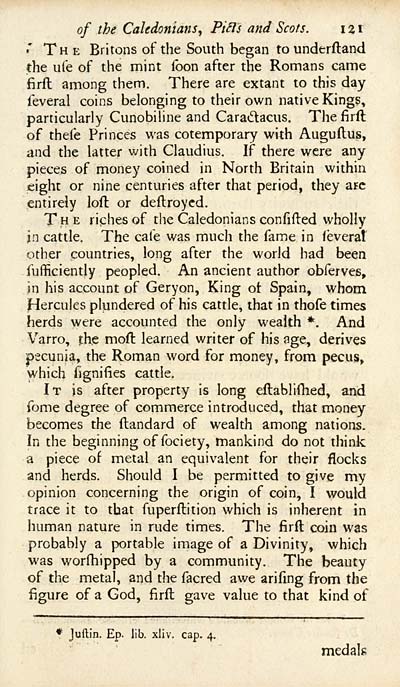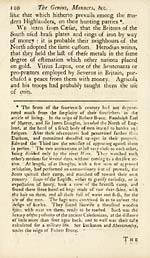Blair Collection > Critical dissertations on the origin, antiquities, language, government, manners, and religion, of the antient Caledonians, their posterity the Picts, and the British and Irish Scots
(159)
Download files
Complete book:
Individual page:
Thumbnail gallery: Grid view | List view

of the Caledonians , PiSls and Scots. 1 2 1
■'The Britons of the South began to underftand
the u("e of the mint foon after the Romans came
firft among them. There are extant to this day
feveral coins belonging to their own native Kings,
particularly Cunobiline and Caradacus. The firft
of thefe Princes was cotemporary with Auguflus,
and the latter with Claudius. If there were any
pieces of money coined in North Britain within
eight or nine centuries after that period, they arc
entirely loft or deftroycd.
The ri<:hes of the Caledonians confifted wholly
in cattle. The cafe was much the fame in feverat
other countries, long after the world had been
fufficiently peopled. An ancient author obferves,
in his account of Geryon, King ot Spain, whom
Hercules plundered of his cattle, that in thofe times
herds were accounted the only wealth *. And
Varro, the moft learned writer of his age, derives
pecunja, the Roman word for money, from pecus,
which fignifies cattle.
It is after property is long eftablifhed, and
Tome degree of commerce introduced, that money
becomes the ftandard of wealth among nations.
In the beginning of fociety, mankind do not think
a piece of metal an equivalent for their flocks
and herds. Should I be permitted to give my
opinion concerning the origin of coin, I would
trace it to that fuperftition which is inherent in
human nature in rude times. The firft coin was
probably a portable image of a Divinity, which
was worftiipped by a community. The beauty
of the metal, and the facred awe arifmg from the
figure of a God, firft gave value to that kind of
♦ Juftin. Ep. lib. xliv. cap. 4.
medals
■'The Britons of the South began to underftand
the u("e of the mint foon after the Romans came
firft among them. There are extant to this day
feveral coins belonging to their own native Kings,
particularly Cunobiline and Caradacus. The firft
of thefe Princes was cotemporary with Auguflus,
and the latter with Claudius. If there were any
pieces of money coined in North Britain within
eight or nine centuries after that period, they arc
entirely loft or deftroycd.
The ri<:hes of the Caledonians confifted wholly
in cattle. The cafe was much the fame in feverat
other countries, long after the world had been
fufficiently peopled. An ancient author obferves,
in his account of Geryon, King ot Spain, whom
Hercules plundered of his cattle, that in thofe times
herds were accounted the only wealth *. And
Varro, the moft learned writer of his age, derives
pecunja, the Roman word for money, from pecus,
which fignifies cattle.
It is after property is long eftablifhed, and
Tome degree of commerce introduced, that money
becomes the ftandard of wealth among nations.
In the beginning of fociety, mankind do not think
a piece of metal an equivalent for their flocks
and herds. Should I be permitted to give my
opinion concerning the origin of coin, I would
trace it to that fuperftition which is inherent in
human nature in rude times. The firft coin was
probably a portable image of a Divinity, which
was worftiipped by a community. The beauty
of the metal, and the facred awe arifmg from the
figure of a God, firft gave value to that kind of
♦ Juftin. Ep. lib. xliv. cap. 4.
medals
Set display mode to: Large image | Transcription
Images and transcriptions on this page, including medium image downloads, may be used under the Creative Commons Attribution 4.0 International Licence unless otherwise stated. ![]()
| Permanent URL | https://digital.nls.uk/76288360 |
|---|
| Description | A selection of books from a collection of more than 500 titles, mostly on religious and literary topics. Also includes some material dealing with other Celtic languages and societies. Collection created towards the end of the 19th century by Lady Evelyn Stewart Murray. |
|---|
| Description | Selected items from five 'Special and Named Printed Collections'. Includes books in Gaelic and other Celtic languages, works about the Gaels, their languages, literature, culture and history. |
|---|

